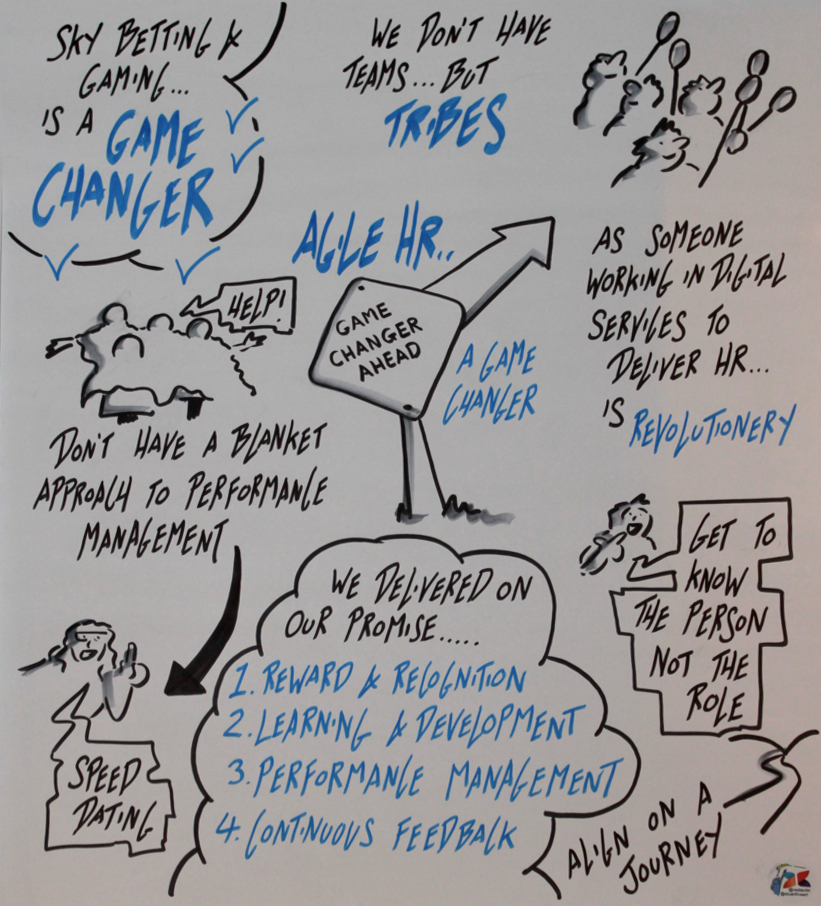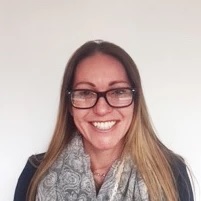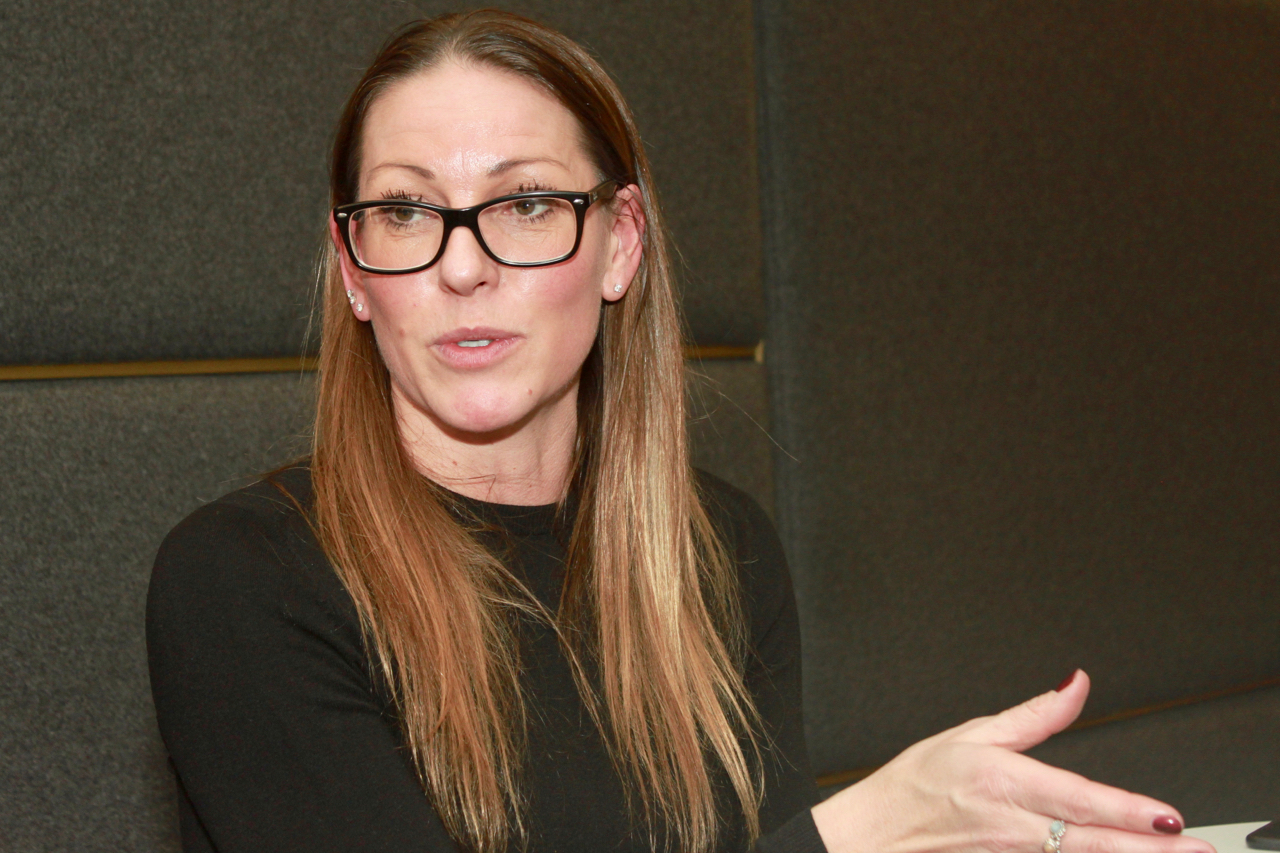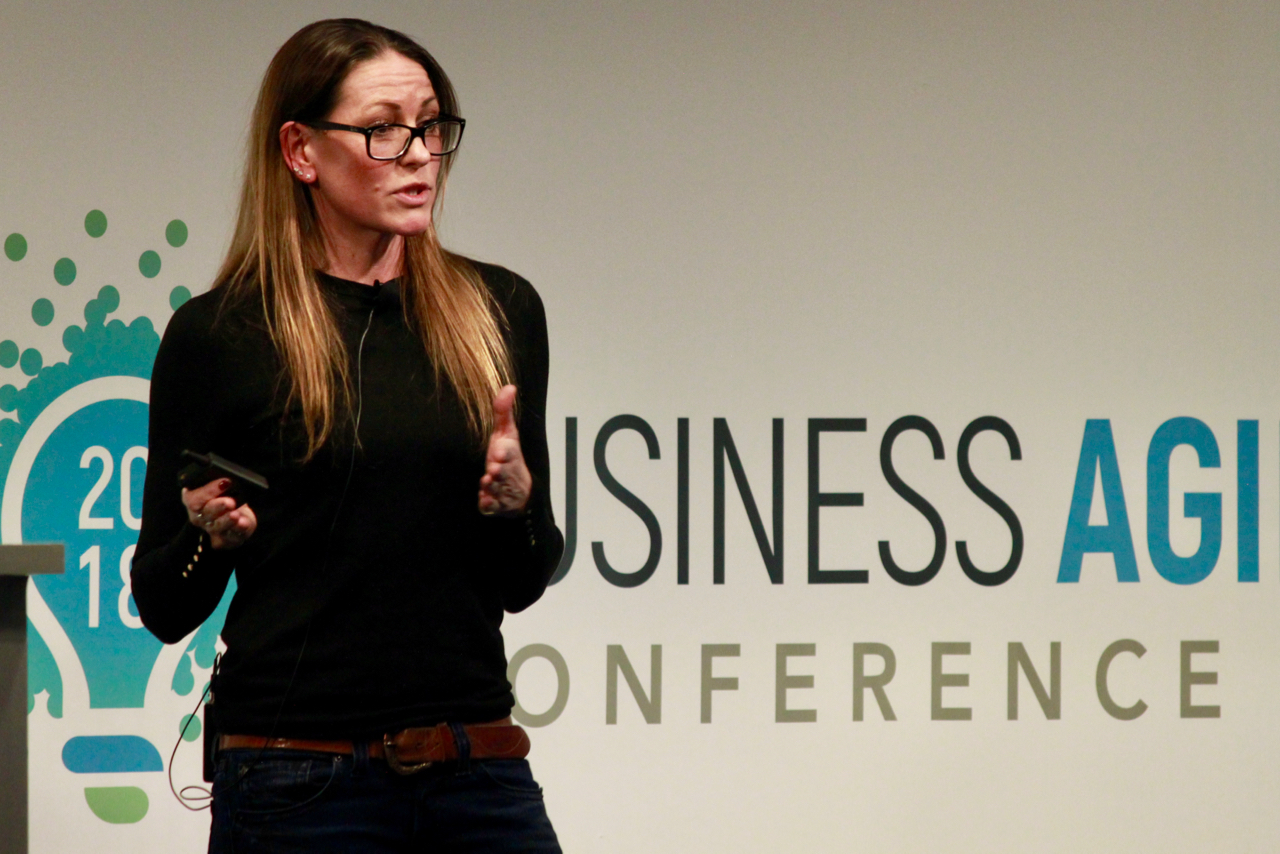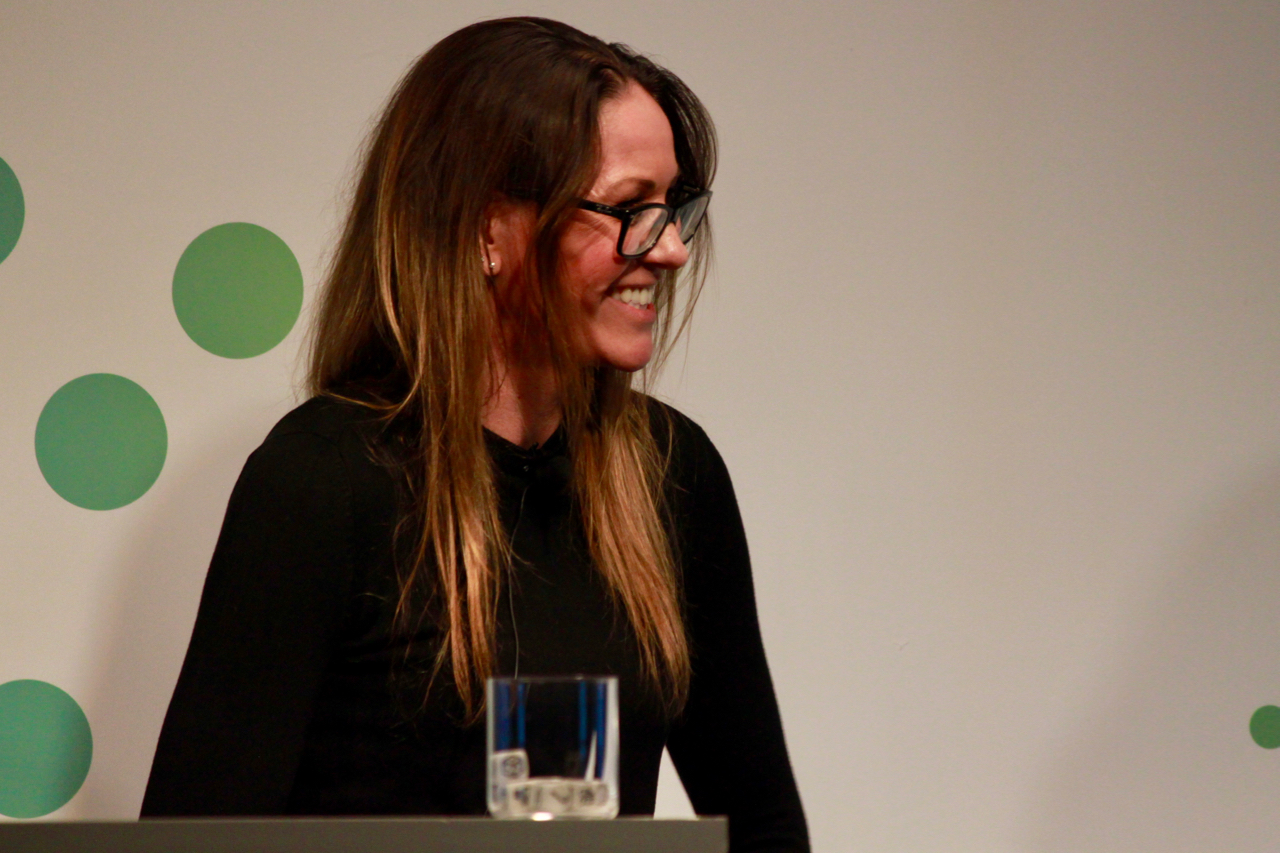Hi, thank you for having me. So I just click the green button, right? Yeah. OK, so Sky Betting and Gaming: we are game changers.
[Video plays on screen] "We are Sky Betting & Gaming, and we are creating the UK's number one digital business to work for.
'Absolutely fantastic company to work for.'
Our story began in Yorkshire in 2001, and today, we operate five major products: Sky Bet, Sky Vegas, Sky Casino, Sky Poker and Sky Bingo, plus our free to play games, Sky Sports Fantasy Football and Sky Sports Super 6.
'It's a really exciting place to be, we're constantly changing what we're doing based on sporting events. We've got Grand National, Cheltenham Festival, we've got the World Cups, Euros, Premier League, it's all really exciting. It's a really, really good place to be.'
But what's really exciting is the scale we do it at. We're an eight hundred million pound business, one of the largest players in the market, and we have a 1000 strong team split to nine dedicated tribes.
'It's really, really fast paced environment, very dynamic, very, very innovative and also really, really cool place to work.'
We handle fifty three million transactions on our busiest day, for over one hundred and fifty thousand customers every day. And we're getting bigger, better, faster and more Agile by the minute.
'People really make this business, and you could be a part of that.'
With our fast paced product innovation, cutting edge technology and talented people, we've outperformed the market every year for the last five years. And the next five look even more amazing. We are Sky Betting and Gaming. We're making betting and gaming better. We're changing the game, and we're fast becoming the number one choice for your career." [end video]
OK, so that gives you a bit of an insight into Sky Betting & Gaming, probably better than I could tell you. So we do aim to be the UK's best digital business, and recently we've been awarded the fifty third best place to work in the UK, which is an achievement that we are massively proud of.
So at Sky Betting & Gaming, we don't have teams, we have tribes. Our tribes are aligned to our products and we have nine key products, so nine key tribes in the business. Our tribes vary in size from around 50 technologists to over 100 technologists. The biggest tribe that we have at Sky Bet is our Bet tribe. And this is around 120 technologists. And it's the Bet tribe, which I'm going to focus on today.
Within our tribes, we have squads, smaller squads that work towards a shared purpose. So in terms of the Agile HR movement, this movement started around two years ago now, so it's not been an overnight movement at all. It's been a significant amount of time.
So two years ago in April 2016, I joined Sky Bet. I was hired by our CTO, and I was brought in into Sky Betting & Gaming with an HR background as a People Operations Manager, so I sit fully embedded within the Bet Tech tribe, completely independent from the HR team. I align into our Sports Book Director, so technical director. And I guess for me, working in technology has taken me from a traditional HR purist way of working, into a world that has challenged conventional thinking, inspired new ways of working for HR, such as a more Agile approach. But ultimately, we have changed and shifted the business culture at Sky Betting & Gaming from a centralized HR-led culture, to a culture led by our people in technology, and this has been absolutely significant for us.
So, fundamental to changing the culture at Sky Betting & Gaming was how we performance managed our people. Our leadership team believed that we needed to give our people a higher incentive, a bonus. We needed to give them a rating, a ranking. We needed to put them in a nine box grid, which we did, and when I first joined Sky Betting & Gaming, the first meeting I sat in was a two hour session where we talked around what boxes people were in. I learned nothing at all about the people I was going to be working with, apart from an argument with the leadership team as to which box they actually fitted in. So we did rank our people, we rated them. We also linked the rating that an individual would receive to a bonus percent. And we went through this process every six months with our people. So we would set objectives, we'd sit with them every six months, we'd give them a rating, not give any real feedback, just give them a number, and that number linked to what percentage bonus they would receive. So we were taking our people through this process every six months, and not only was it not working for our engineers, our people in technology, but it was fundamentally undermining everything that we wanted it to achieve.
So we were actually demotivating half our workforce, twice a year with a standardized blanket approach to performance management. So we needed to change this way of working, so instead of going to HR and seeking permission from HR, I thought, let's ask our people. What do our people really want? What do our technologists, our engineers want from performance management? What actually motivates an engineer to get up out of bed every day and come to work? So I set up some speed dating evenings.
Now, the engineers loved the term 'speed dating'. Not at all. So I thought I was in tune with them, but obviously not. But however, what they did genuinely love about this was the free beer and the free food, and actually a chance to be heard. So there was 120 technologists within the Bet tribe, and I listened to each and every one of them and actually got face-to-face feedback. This wasn't a faceless survey that was sent out, it was actually an insight getting to know our people in technology. And the two main things, messages, that came out of these speed dating evenings were that they wanted to work on challenging tech, and they wanted to work with amazing colleagues. Not one response was, "I want a higher bonus percent. Next time at my performance management review, I want a higher rating".
So we needed a new approach to performance management, and by no means were we going to get this across the whole of the business. So we proposed within the Bet tribe, the tribe I worked, that we would trial a new approach. So we would trial a new approach to performance management, and this approach would be just dedicated to one tribe within the business. We were time box a trial, so we would do it as a 12 month period. We trialed it on the Bet tribe, and we just trialed it within technology. Now, again, we didn't seek permission from HR for this. This was purely tech-led. So what we actually changed and what we actually delivered within this Bet tribe was focused around four key areas: performance management, reward and recognition, L&D (learning and development), and continuous feedback. So, ran performance management just for our Bet tribe. We no longer rated or ranked our individuals. We no longer set objectives. In fact, we didn't ask for any documentation at all. All we asked was for our people managers, to have regular one-to-ones, regular conversations with their people, weekly or fortnightly. Get to know the person behind the role, don't hide anymore behind a number or a rating, actually start to give constructive feedback.
So we focus more on the quality of the conversations that our people managers were having with their individuals. With reward and recognition, we completely decoupled the link between the rating to the bonus percent. So instead of that, we didn't take away the bonus altogether, but what we offered was a flat rate bonus. Across everybody in Bet tribe received the same percentage bonus every six months. So it was fair. It was predictable and we did it that, irrelevant of any objective setting, that you received a "thank you bonus", we called it. We also gave the power of recognition into people's hands. Rather than it coming from a manager, we introduced an opera bot on Slack - one of our engineers wrote it, - and rather than, "have a car, have a car", it was "have a voucher", and colleagues could say thank you to their friends within the team, say "job well done", and it was an instant message that came up within the Slack message and they received an instant 25 pound Amazon voucher.
Learning and development. So our people were asking, and saying that they wanted to work on challenging tech, they want a time to learn. So again, in the Bet tribe, we gave them 10 percent dedicated time to learn. So on Friday afternoon at 12 o'clock, we have dedicated L&D time in the Bet tribe. So remember, this was only purely at this moment in time, just in one small tribe, I guess within the Bet tribe, I guess large enough to be able to test our approach - but this wasn't happening in the rest of the business.
We also give our engineers a thousand pounds every year, a tech ninja fund, and this is basically theirs to spend on whatever they choose. So it's putting the autonomy and the choice of learning into their hands, with continuous feedback. So even though I held the speed dating evenings at the start of the trial, we continue to run feedback sessions with our engineers. Is it working, is it giving you the right things? Are we on a better track, are are we working in a better way with all these changes? And actually, at the end of the trial, at the end of the 12 months, we had data and evidence to prove that actually, this was such a great way of working.
So our Net Promoter Score in 2016 before we launched the trial in Bet tech was 36. At the end of the trial of the 12 month period, we had gone up to 55. This was massive for us and such an achievement. Now, the leadership team started to listen now - and we're like, you're on to something. So this was the Net Promoter Score, the question that we asked to gain this insight was, "would you recommend Sky Betting & Gaming to your friends and family?"
So this success led to two significant changes within Sky Betting & Gaming. We took the approach to performance management and the new way of working that we'd been operating in the Bet tribe for the past 12 months, and we rolled out to the rest of the business. Not only did we do that, but we restructured our HR team.
So we reorganized HR. So how I was working, completely decentralized, not aligned into HR at all, I was aligned into tech and I still am aligned into tech. However, with our HR department, we still now do have a centralized HR team, but that team is purely to help with payroll queries, AR issues. What we've now done, is we've got people operations embedded in every tribe within Sky Betting & Gaming. So we've decentralized it to an extent. We've embedded people operations into the tribe so they sit with the customers, they actually sit and they understand the ways of working in the tribe. What do the actual people need that are in the tribes that they work?
So this hasn't been easy, and we have had constant challenge, and throughout the 12 month period there was constant challenge from HR and a lot of pushback. However, the HR team did see the advantages of working in this way and did want to change. So we started the mindset change, I guess, with a kick-off week. So we all came together as a people operations squad, and we dedicated one week of intense coaching, learning and development. We knew that we couldn't do this by ourselves, so Fabiola came over and helped us, and worked with us and supported us for the full week, and we went through so much within that week. It was a massive journey in itself, just that one week. The first time that we'd ever come together as a team, I was thinking, "oh, this is my special way of working. Do I really want to share it with everybody else, are they all up to it? Can we do this?" But I mean, it was absolutely amazing experience, the week was brilliant.
So just to give you a bit more insight into what we actually did in that week, and we covered loads of topics. We went back to basics on Agile. What does Agile mean? How can Agile work for HR, can it truly work for HR? And if so, what does that look like for us? We went through personas, the voice of the customer - a different language. We were learning a complete different language, and I've been working in this way for the past 12 months with the tech teams. But for people moving from this traditional HR way of working into this, "Right, we're all together now. We're a squad. We've got this one week, we've got to learn it. We've got to get up to speed. We've got to be speaking the language of our customers."
It was massively intense. But for me, some of the key things that came out of this session was visualizing our work. I mean, when we started to look at all the work we had in progress, it was overwhelming. We also did a Gemba walk, and we went and visited one of our technical squads. So they invited us along and we asked questions, what the different roles, what do you do in your daily standups? And they were absolutely massively intrigued to have HR stood at their daily standup asking them questions in terms of how they worked. They was so intrigued, in fact, that they actually came and joined us for one of our standups to see what we were doing and how we were working, and they're actually asking us questions - so it was massive for us.
This is just a brief insight into the week. [video plays on screen]
OK, so we came up with the terminology, POPs Rocks. We'd formed an identity which was absolutely key after a week of working.
So after the week, what did we achieve? Well, we achieved lots of champagne drinking and cake eating at the end of it, which was brilliant. So we achieved many things. But I think the main achievement for me, was eventually I had a team of colleagues that were on the same journey as me. They was thinking in a similar manner as myself, I was no longer this lone wolf in Sky Betting & Gaming doing something different from the rest of the business. So at last I had a team of colleagues in which we can work together and we can support each other through this journey.
Our head of people operations, after the week stated this: so she said, "I'm in another universe, I find it hard to believe that other HR folks don't understand the new world of work. Even though I did not really understand it myself before this workshop week, I now have a completely different understanding of people operations, and I speak a different language." So yep, we are still on a journey we've only been established for six months, so we are working our way through this, we have got a long way to go. We are constantly learning, continuously adapting and learning. But it's definitely the right approach for SSky Betting & Gaming, and we've come significantly such a long way.
So people operations, not just a name change, but a game change. Thank you.




